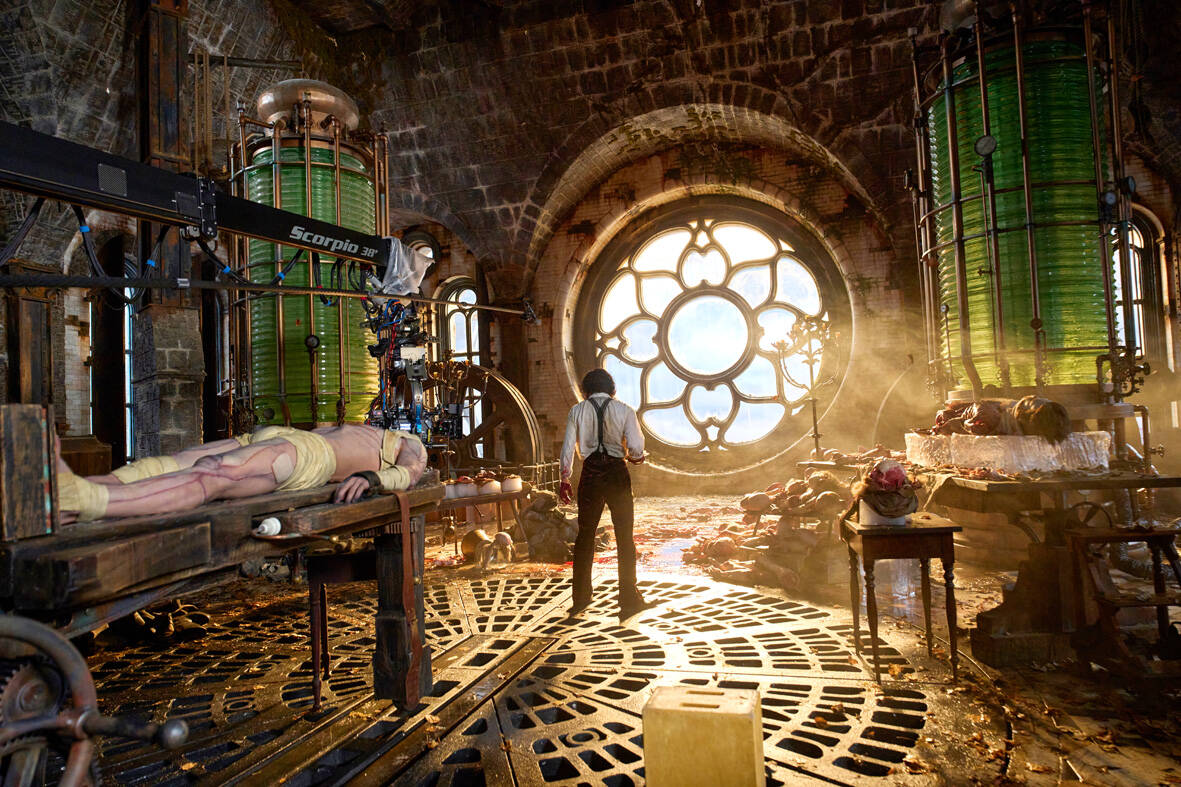Guillermo del Toro has been telling monster stories for as long as he’s been making films. A romantic with keen appreciation for the macabre, his creations are things of strange beauty, haunting, poetic and unforgettable. It’s no wonder his earliest love was Frankenstein, first the Boris Karloff film, then the novel, which set him on a path to becoming a filmmaker.
Don’t expect a by-the-letter adaptation of Mary Shelley’s immortal story, however. This Frankenstein, streaming on Netflix on Nov. 7, is an interpretation, a reading of that tale of the brilliant scientist and his creation, from one of our most visionary filmmakers who has made it very much his own. Is it his best? No, but it overcomes the handicap of the dreaded passion project that has befuddled more than a few greats before him.
It is a story about stories, about fathers and sons, innocents and monsters, and the madness of creation. And while del Toro lets both Victor Frankenstein (Oscar Isaac) and the creation (Jacob Elordi) tell their sides of the tale, this is not exactly neutral. Del Toro has always loved the “monster” and, perhaps because of that love, has stripped him of the complexities that made Shelley’s character so fascinating. Here, the creation is an innocent, subject to the same impulses of rage as a toddler. But, thankfully for parents everywhere, toddlers can, generally, be contained. This creature’s strength is superhuman, which is unfortunate for anyone who happens to provoke him. He doesn’t just kill — he skins, he tears jaws off, he tosses grown men with a velocity that suggests they weigh little more than a baseball. It’s all quite grisly.

Photo: Netflix via AP
But neither he nor Victor is without reason — all men are products and victims of their own fathers, whose mothers and mother figures (in both cases, Mia Goth, a metaphor that is perhaps a little too on the nose) cannot protect them, del Toro tells us, and these two are particularly doomed.
Isaac is delightful as Victor, brilliant, egotistical and with a flair for the theatrical, a defiant outsider consumed with the idea of making life from death. He’s obsessed with surpassing his father (a menacing Charles Dance), intellectually and scientifically, and the idea that he might have been able to save his late mother. He’s relegated himself to being a mad loner, a proud exile who has softness only for his brother William (Felix Kammerer) and William’s fiancee, Elizabeth (Goth), an excellent foil for Victor’s hubris. While Elizabeth might embody something of a feminine cliche whose instinct is to nurture and protect the creation, rather than mold and control him, Goth imbues her with sharp wit and wisdom. She’s the kind who might even be able to save Victor from himself (or at least that’s what he thinks), if only she weren’t marrying his brother.
And then, of course, there is the creature. There are no bolts in this head: Victor’s design is that of an artist attempting to make a marble Adonis, but whose stitches never quite disappear and whose scraggly hair suggests the eerie undead. In Elordi’s hands, the creature is a sensitive soul tortured by his own existence. His default is gentleness, but his survival instincts are very real, and very violent. Victor quickly comes to hate his creation because he believes it dumb and he leaves it to fend for itself.

Photo: Netflix via AP
If the first half the film is a symphony of crazed creation, the second is one of discovery, a coming-of-age story for a monster who just wants a companion but who is only met with hatred, disgust and violence — save for an old, blind man (David Bradley) who, like Elizabeth, sees a gentle soul. The creature is also quick to learn under a kinder tutor, which proves to be a double-edged sword as he comes to understand the nature of his being and the curse of eternal life. It’s all very spelled out on our behalf.
The gothic grandeur on display is familiar territory for del Toro, though he’s often had to stay within certain confines. Working with many of his regular collaborators on Frankenstein, it seems no expense was spared in this elaborate, maximalist world-building (production designer Tamara Deverell), from Victor’s lavish childhood estate to the abandoned irrigation plant that will become his laboratory. The romantic, beautiful, utterly impractical costumes, too, (overseen by Kate Hawley) could fill a museum, not to mention all the severed limbs. It all comes to electrifying life with Alexandre Desplat’s appropriately epic score.
Everything about Frankenstein is larger than life, from the runtime to the emotions on display: The empathy, the anguish, the rage, the regret. And it can be a bit exhausting, too, a lifetime of dreaming jam packed into 149 minutes. Hopefully del Toro is at peace with his creation: It might not be masterpiece material, but it has a soul and is an undeniably beautiful, worthwhile addition to the canon.

Photo: Netflix via AP

The Lee (李) family migrated to Taiwan in trickles many decades ago. Born in Myanmar, they are ethnically Chinese and their first language is Yunnanese, from China’s Yunnan Province. Today, they run a cozy little restaurant in Taipei’s student stomping ground, near National Taiwan University (NTU), serving up a daily pre-selected menu that pays homage to their blended Yunnan-Burmese heritage, where lemongrass and curry leaves sit beside century egg and pickled woodear mushrooms. Wu Yun (巫雲) is more akin to a family home that has set up tables and chairs and welcomed strangers to cozy up and share a meal

Dec. 8 to Dec. 14 Chang-Lee Te-ho (張李德和) had her father’s words etched into stone as her personal motto: “Even as a woman, you should master at least one art.” She went on to excel in seven — classical poetry, lyrical poetry, calligraphy, painting, music, chess and embroidery — and was also a respected educator, charity organizer and provincial assemblywoman. Among her many monikers was “Poetry Mother” (詩媽). While her father Lee Chao-yuan’s (李昭元) phrasing reflected the social norms of the 1890s, it was relatively progressive for the time. He personally taught Chang-Lee the Chinese classics until she entered public

Last week writer Wei Lingling (魏玲靈) unloaded a remarkably conventional pro-China column in the Wall Street Journal (“From Bush’s Rebuke to Trump’s Whisper: Navigating a Geopolitical Flashpoint,” Dec 2, 2025). Wei alleged that in a phone call, US President Donald Trump advised Japanese Prime Minister Sanae Takaichi not to provoke the People’s Republic of China (PRC) over Taiwan. Wei’s claim was categorically denied by Japanese government sources. Trump’s call to Takaichi, Wei said, was just like the moment in 2003 when former US president George Bush stood next to former Chinese premier Wen Jia-bao (溫家寶) and criticized former president Chen

President William Lai (賴清德) has proposed a NT$1.25 trillion (US$40 billion) special eight-year budget that intends to bolster Taiwan’s national defense, with a “T-Dome” plan to create “an unassailable Taiwan, safeguarded by innovation and technology” as its centerpiece. This is an interesting test for the Chinese Nationalist Party (KMT), and how they handle it will likely provide some answers as to where the party currently stands. Naturally, the Lai administration and his Democratic Progressive Party (DPP) are for it, as are the Americans. The Chinese Communist Party (CCP) is not. The interests and agendas of those three are clear, but